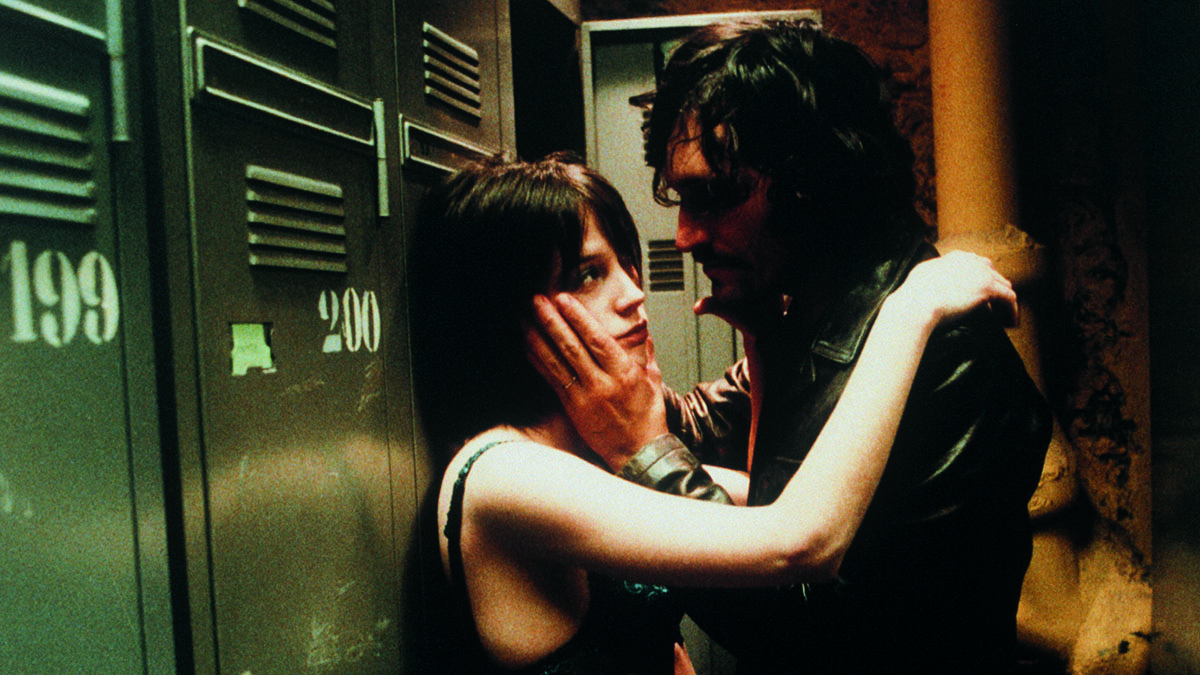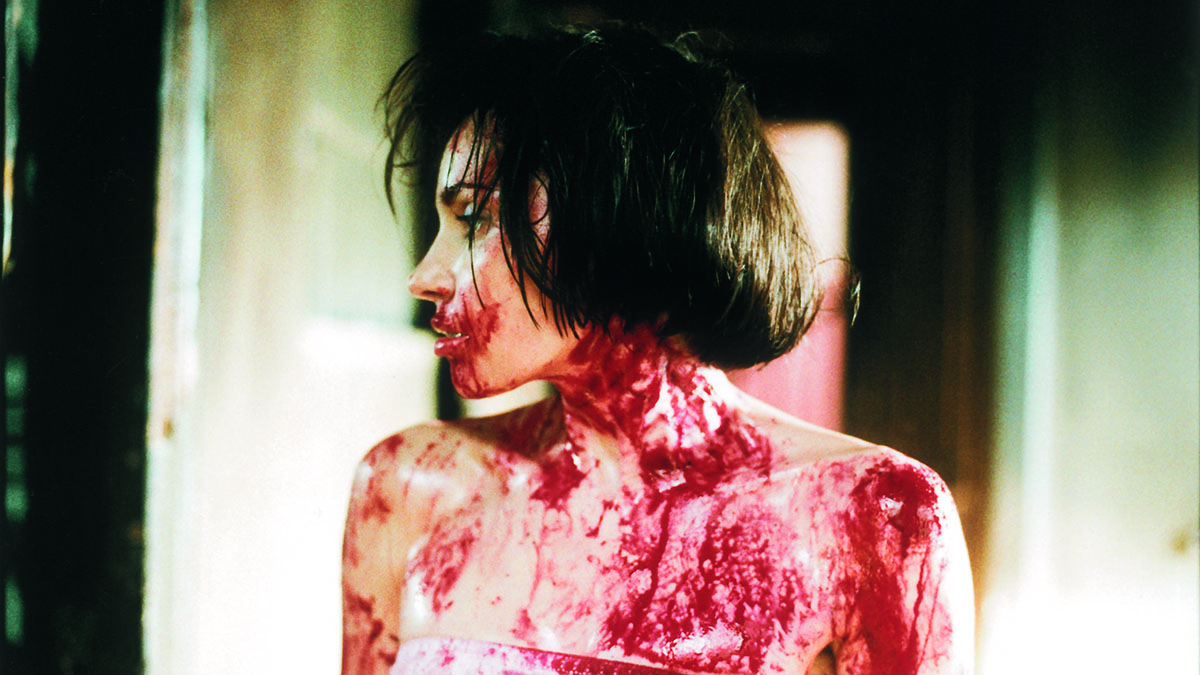Carnal Cravings: The Limits of Desire in Claire Denis’s Trouble Every Day

Critics Campus 2023 participant Indigo Bailey examines the unsettling and controversial combination of horror and sensuality in Claire Denis’s brutal, beguiling 2001 feature.
A hotel maid washes her feet, stretching them one by one into a basin. Inside her locker is a collection of jam jars and discs of soap in scalloped paper, swiped between trips heaving guests’ belongings. She is a minor character in Claire Denis’s much-maligned foray into the horror genre, Trouble Every Day (2001), destined to be a victim of the slow, sexualised cannibalism for which the film is infamous; yet we are immersed in the rhythms of her routines, each banal gesture – dressing, smoking, unbuckling her motorcycle helmet – conjuring a future. Denis’s approach is not so much suspenseful as it is generous: there is always time to soak sore feet and squirrel away small objects.
This Parisian hotel is the site of the honeymoon of two wide-eyed Americans: June (Tricia Vessey) and Shane (Vincent Gallo). We meet them on the aeroplane, where Shane – a chemist working for Big Pharma – slips from his wife’s arms to indulge in fantasies of her blood-slicked body in the bathroom. In Paris, Shane searches for Léo (played by Denis regular Alex Descas), a doctor and former colleague who has been exiled from the scientific community after writing an unspeakable paper; Léo is also the husband of Coré (Béatrice Dalle), an enigmatic cannibal who lures men with languid ferocity. During his Sisyphean quest to find the disgraced scientist, Shane pulls up Léo’s website, which alludes to the aims of his research: to rectify “problems of libido and mental diseases”. Here, at the cusp of knowledge, the camera swarms into pixelated footage of trees.
Throughout Trouble Every Day, expectations of discovery and release are repeatedly thwarted in favour of an atmospheric unease. An introspective Shane prowls, loitering in cafés; June floats through hallways, practising her bonjours. Meanwhile, barricaded by Léo, Coré pokes her fingers through the slats of her bedroom window, silently beckoning a pair of teenagers. While the film’s plot is sparse, Denis’s ardent focus on lurking and longing creates its own mood, a sensation of moving through mucus that is intensified by the amniotic thrum of Tindersticks’ soundtrack.
Although it includes no fangs or upright slumbers, many critics have labelled Trouble Every Day a vampire movie, as if attempting to fill in its gaps with some familiar lore. Yet this eludes the mystery at the film’s heart: the untraceability of Shane and Coré’s shared hunger for flesh. To a bobbed Frenchwoman questioning him in a lab, Shane admits that he wishes Coré had been his lover; it’s as though his desire for Coré has itself festered, causing their fantasies to become eerily fused in their years apart.
Trouble Every Day was seen as a wild departure from Denis’s more well-known work. The film was preceded by Beau Travail (1999), a critical breakthrough that traverses the smouldering erotics and tensions within a French legion in Djibouti; as soldiers iron out pleats under the sun, Denis focuses on the daily reverberations of colonial violence rather than its cinematic climaxes. Through the salt-bleached vision of cinematographer and frequent Denis collaborator Agnès Godard, Beau Travail unfurls as an evolution of movements, officer Galoup’s (Denis Lavant) disciplined body slowly loosening into disco.

Trouble Every Day
While Trouble Every Day shares Beau Travail’s fascination with everyday gestures, it also engages with violence-as-spectacle. In an influential take-down, The Village Voice critic J. Hoberman called the film a lazy experiment in shock value, aiming to attract an American crowd raised on slashers and MTV with its “eroticized gore”. This cooler reception was only further shaped by the casting of Dalle and Gallo, actors described in Peter Bradshaw’s review in The Guardian as “absurdly and outrageously conceited”. While Dalle had long courted transgression in life and cinema alike, Gallo was at this time a freshly anointed provocateur, his notoriety only later erupting amid a verbal duel with critic Roger Ebert over the former’s project The Brown Bunny (2003).
Trouble Every Day has since been linked to New Extremity, a scattered field of contemporaneous European movies that include ‘extreme’ depictions of sexuality, violence or psychological terror, such as Olivier Assayas’s post-Y2K nightmare demonlover (2002) and Gaspar Noé’s Enter the Void (2009). Although Trouble Every Day’s violence is confronting, words like ‘extreme’ are ill-fitting when it comes to Denis. Her film is brutal, but it is also mundane; bloody onslaughts are not so much climaxes as they are the pooling of persistent currents.
What is truly unnerving about Trouble Every Day is not its cruelty, but the coexistence of this cruelty with Denis’s usual sensuousness. In the opening scene, anonymous lovers share a prolonged kiss in a car, their pale hands blurring in the dark. Though they are never seen again, everything happens in the wake of their passion. Lengthy shots of cannibalism are muffled by Godard’s choice of gauzy film stock. In roving close-ups, she segments the bodies of her subjects and lingers on lesions, crevices and shadows with a curdling intensity. Yet, as often as she drags the camera across ravaged limbs, Godard settles on moments of tenderness: Léo sponging Coré’s blood-streaked back; the newlyweds coiled in a slack heart shape on their hotel bed.
This tentative lover’s gaze that imbues Trouble Every Day only makes its atrocities more disturbing. Violence, Denis insists, is not a moment that can be picked out like a blackened popcorn kernel. The hotel maid’s excruciating end is inseparable from labour’s physical strain: her shoulders slumped beneath the lovers’ baggage; her head sinking with relief into a guest’s pillow.
In retrospect, Trouble Every Day is a clear precursor to a swathe of recent horror films acclaimed for their ambience and ambiguities: Jonathan Glazer’s Under the Skin (2013) follows a highway-haunting woman who wants only to consume men by absorbing them into a glossy abyss, while Julia Ducournau’s 2021 Palme d’Or–winning Titane is a strange hybrid of energetic horror and seething mystery, its murderous, not-quite-human protagonist achingly oblique. Unrestrained by tight plotting, heavy exposition or popular folklore, terror becomes diffuse. Like Glazer and Ducournau, Denis embraces horror as a language, not a logic. Fistfuls of guts are smeared on walls as the score swells into a gothic drone, but the scary part is that we can’t pin down the pathology behind it all. Horror, with its pull towards desperation and delay, is the perfect excuse for Denis to stretch desire to its limits.